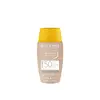What's inside
What's inside
 Key Ingredients
Key Ingredients

 Benefits
Benefits

 Concerns
Concerns

 Ingredients Side-by-side
Ingredients Side-by-side

Water
Skin ConditioningAlcohol Denat.
AntimicrobialCI 77891
Cosmetic ColorantButyl Methoxydibenzoylmethane
UV AbsorberBis-Ethylhexyloxyphenol Methoxyphenyl Triazine
Skin ConditioningDibutyl Adipate
EmollientButylene Glycol Dicaprylate/Dicaprate
EmollientC12-15 Alkyl Benzoate
AntimicrobialEthylhexyl Salicylate
UV AbsorberEthylhexyl Triazone
UV AbsorberDiethylamino Hydroxybenzoyl Hexyl Benzoate
UV FilterPhenylbenzimidazole Sulfonic Acid
UV AbsorberSilica
AbrasiveSilica Dimethyl Silylate
EmollientCocoglycerides
EmollientCopernicia Cerifera Cera
EmollientCarnitine
CleansingGlycyrrhiza Inflata Root Extract
Skin ConditioningGlycyrrhetinic Acid
Skin ConditioningGlycerin
HumectantTapioca Starch
Chondrus Crispus Extract
Skin ConditioningHydroxypropyl Methylcellulose
Emulsion StabilisingXanthan Gum
EmulsifyingBehenyl Alcohol
EmollientCetearyl Alcohol
EmollientStearic Acid
CleansingMyristic Acid
CleansingArachidic Acid
CleansingOleic Acid
EmollientPalmitic Acid
EmollientSodium Stearoyl Glutamate
CleansingSodium Hydroxide
BufferingSodium Chloride
MaskingTrisodium EDTA
Hydroxyacetophenone
AntioxidantPhenoxyethanol
PreservativeCI 77492
Cosmetic ColorantCI 77491
Cosmetic ColorantCI 77499
Cosmetic ColorantWater, Alcohol Denat., CI 77891, Butyl Methoxydibenzoylmethane, Bis-Ethylhexyloxyphenol Methoxyphenyl Triazine, Dibutyl Adipate, Butylene Glycol Dicaprylate/Dicaprate, C12-15 Alkyl Benzoate, Ethylhexyl Salicylate, Ethylhexyl Triazone, Diethylamino Hydroxybenzoyl Hexyl Benzoate, Phenylbenzimidazole Sulfonic Acid, Silica, Silica Dimethyl Silylate, Cocoglycerides, Copernicia Cerifera Cera, Carnitine, Glycyrrhiza Inflata Root Extract, Glycyrrhetinic Acid, Glycerin, Tapioca Starch, Chondrus Crispus Extract, Hydroxypropyl Methylcellulose, Xanthan Gum, Behenyl Alcohol, Cetearyl Alcohol, Stearic Acid, Myristic Acid, Arachidic Acid, Oleic Acid, Palmitic Acid, Sodium Stearoyl Glutamate, Sodium Hydroxide, Sodium Chloride, Trisodium EDTA, Hydroxyacetophenone, Phenoxyethanol, CI 77492, CI 77491, CI 77499
Zinc Oxide
Cosmetic ColorantDimethicone
EmollientIsododecane
EmollientIsostearyl Isostearate
EmollientButyrospermum Parkii Oil
EmollientTitanium Dioxide
Cosmetic ColorantPropylheptyl Caprylate
EmollientDipropylene Glycol
HumectantMethyl Methacrylate Crosspolymer
Silica
AbrasivePolymethylsilsesquioxane
Water
Skin ConditioningPolyhydroxystearic Acid
EmulsifyingHdi/Trimethylol Hexyllactone Crosspolymer
CI 77492
Cosmetic ColorantPEG-10 Dimethicone
Skin ConditioningPolysilicone-11
Triethoxycaprylylsilane
Salicylic Acid
MaskingButylene Glycol
HumectantCI 77491
Cosmetic ColorantCapryloyl Glycine
CleansingPropyl Gallate
AntioxidantCI 77499
Cosmetic ColorantHydrogenated Lecithin
EmulsifyingCaprylyl Glycol
EmollientDecyl Glucoside
CleansingTocopherol
AntioxidantEctoin
Skin ConditioningMannitol
HumectantXylitol
HumectantAlumina
AbrasiveMagnesium Oxide
AbsorbentZinc Oxide, Dimethicone, Isododecane, Isostearyl Isostearate, Butyrospermum Parkii Oil, Titanium Dioxide, Propylheptyl Caprylate, Dipropylene Glycol, Methyl Methacrylate Crosspolymer, Silica, Polymethylsilsesquioxane, Water, Polyhydroxystearic Acid, Hdi/Trimethylol Hexyllactone Crosspolymer, CI 77492, PEG-10 Dimethicone, Polysilicone-11, Triethoxycaprylylsilane, Salicylic Acid, Butylene Glycol, CI 77491, Capryloyl Glycine, Propyl Gallate, CI 77499, Hydrogenated Lecithin, Caprylyl Glycol, Decyl Glucoside, Tocopherol, Ectoin, Mannitol, Xylitol, Alumina, Magnesium Oxide
 Reviews
Reviews

Ingredients Explained
These ingredients are found in both products.
Ingredients higher up in an ingredient list are typically present in a larger amount.
Ci 77491 is also hydrated iron III oxide. It's sole purpose is to give a red/pink hue to products.
Iron III oxides are classified as inorganic chemicals for coloring.
Synthetically created Ci 77491 is considered safer than those naturally found. This is because the synthetically created version may contain less impurities. Iron oxides are generally non-toxic and non-allergenic.
Learn more about CI 77491Ci 77492 is also hydrated iron III oxide. It's sole purpose is to give a yellow hue to products.
Iron III oxides are classified as inorganic chemicals for coloring.
Synthetically created Ci 77492 is considered safer than those naturally found. This is because the synthetically created version may contain less impurities. Iron oxides are generally non-toxic and non-allergenic.
Learn more about CI 77492Ci 77499 is also hydrated iron III oxide. It is created from mixing red and black iron oxides. This helps give shades of darkness to a product.
Iron III oxides are classified as inorganic chemicals for coloring.
Silica, also known as silicon dioxide, is a naturally occurring mineral. It is used as a fine, spherical, and porous powder in cosmetics.
Though it has exfoliant properties, the function of silica varies depending on the product.
The unique structure of silica enhances the spreadability and adds smoothness, making it a great texture enhancer.
It is also used as an active carrier, emulsifier, and mattifier due to its ability to absorb excess oil.
In some products, tiny microneedles called spicules are made from silica or hydrolyzed sponge. When you rub them in, they lightly polish away dead skin layers and enhance the penetration of active ingredients.
Learn more about SilicaWater. It's the most common cosmetic ingredient of all. You'll usually see it at the top of ingredient lists, meaning that it makes up the largest part of the product.
So why is it so popular? Water most often acts as a solvent - this means that it helps dissolve other ingredients into the formulation.
You'll also recognize water as that liquid we all need to stay alive. If you see this, drink a glass of water. Stay hydrated!
Learn more about Water